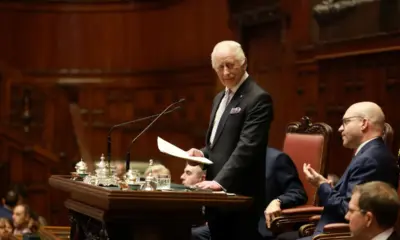Latest News
London’s Climate Push: How the City’s Green Transition is Reshaping Urban Finance

London is entering a decisive phase in its environmental transformation. As climate concerns climb the global agenda, the city’s financial institutions and corporations are leading efforts to decarbonize and invest in sustainability. In 2025, London is not only setting ambitious targets for carbon neutrality but also positioning itself as a world hub for green finance, sustainable infrastructure, and low-emission innovation.
Green Finance Becomes a Core Strategy
The City of London Corporation has announced that by 2030, all major financial institutions based in the Square Mile must disclose their carbon exposure and transition plans. This aligns with the UK’s Green Finance Strategy, which requires firms to integrate climate risk into decision-making.
Institutions like HSBC, Barclays, and Lloyds have already launched climate-linked lending programs that reward companies for meeting sustainability benchmarks. The London Stock Exchange now lists over $150 billion in green bonds, making it one of the largest sustainable finance markets globally.
Furthermore, the Bank of England is tightening oversight of climate-related risks, requiring annual stress tests to evaluate banks’ exposure to carbon-intensive industries. Analysts say this approach places the UK alongside the EU in aligning finance with climate accountability, without stifling competitiveness.
Urban Sustainability and Corporate Action
Beyond finance, London’s city government is accelerating initiatives in clean transport, renewable energy, and circular economy practices. The London Climate Action Plan (LCAP 2025) aims to cut emissions by 45% from 2019 levels by 2030. Investments are focused on electric public transport, solar retrofitting for municipal buildings, and green urban corridors designed to combat pollution and heat islands.
Corporate participation has been strong. Firms in Canary Wharf are transitioning to fully renewable energy grids, while retail and hospitality chains are adopting stricter waste reduction policies. Startups specializing in carbon capture, sustainable packaging, and smart energy systems are gaining investor attention, supported by government-backed Green Innovation Grants.
Global Partnerships and Economic Impact
London’s sustainability push has a strong international dimension. Through collaborations with the European Investment Bank and Asian Infrastructure Investment Bank, the city is channeling funds toward emerging market green projects, reinforcing its leadership in sustainable development financing.
The UK’s Green Investment Summit 2025 attracted delegates from over 50 countries, focusing on financing low-carbon infrastructure in Africa and Asia. Experts say this strengthens London’s post-Brexit soft power by aligning economic diplomacy with environmental goals.
Conclusion
London’s climate and sustainability agenda is reshaping how the city does business. From green bonds to electric transport, environmental accountability has become central to economic strategy. While challenges remain, including balancing growth with emissions cuts — the capital’s progress underscores a clear message: the future of finance and policy in London is inseparable from the future of the planet.




















